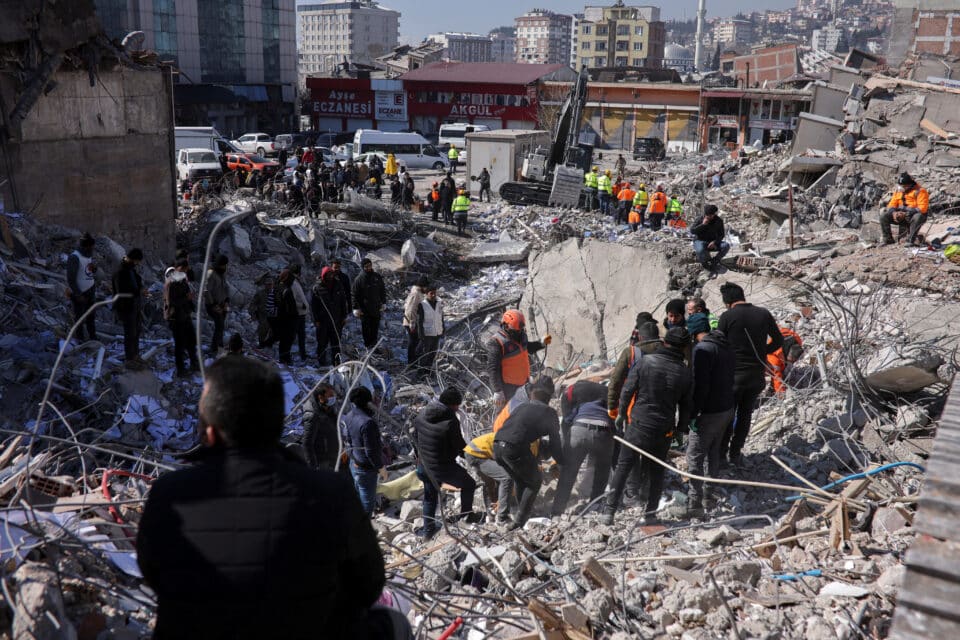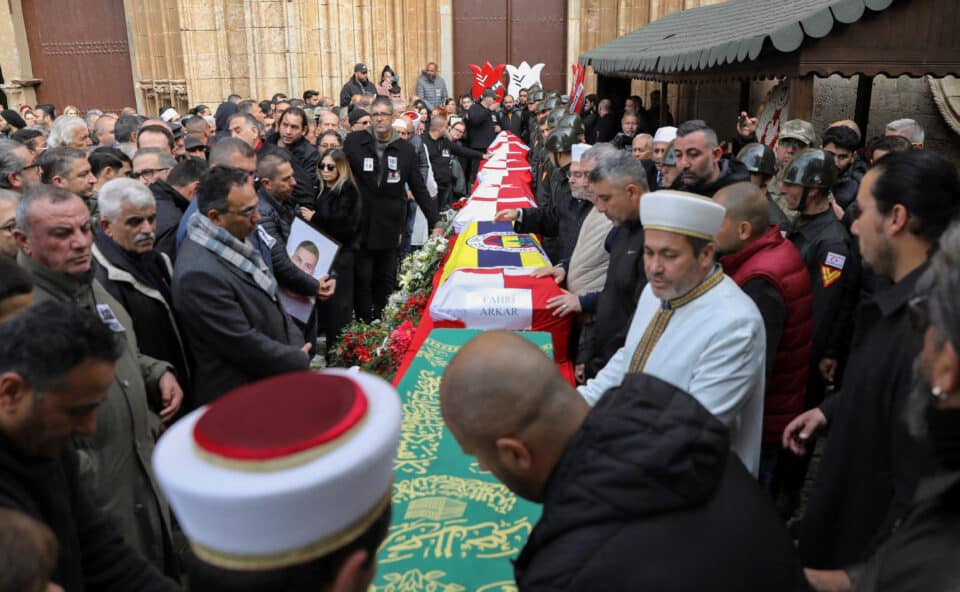Politics hamper work of bicommunal committees. The Turkish earthquake was one tragic example
Fears that certain bicommunal technical committees are underutilised have been exacerbated by the politics which followed Turkey’s tragic earthquake, after the failed attempts from Greek Cypriot communities to deliver humanitarian aid hassle-free to their Turkish Cypriot counterparts.
The devastating impact of the earthquake on February 6 in south Turkey and Syria, left over 50,000 dead and more than five million people homeless and displaced. The numbers are staggering.
Closer to home, Famagusta grieved the loss of an entire co-ed volleyball team made up of secondary school students, who had gone on a trip to Turkey for a sports competition.
A policy brief co-authored by Mete Hatay and Ipek Borman, published by Cyprus’ bi-communal research centre PRIO, highlights the death of the Famagusta students “was a collective trauma for the community that many compared to the pain of the 1963-1974 intercommunal strife on the island.”
This time around, the Turkish Cypriots had the support of their Greek Cypriot compatriots, the paper highlights.
“(Though) many Greek Cypriots expressed a strong desire to transcend the divide and share Turkish Cypriots’ grief, the political potential of this empathy was immediately impeded by the Cyprus problem.”
What went wrong?
Speaking to the Cyprus Mail, Borman explains the entire wave of humanitarian efforts and social dynamic, ranging from donations to expressing grief and support, as well as some institutions such as universities lowering their flags, “immediately fell prey to the politics of the Cyprus problem”.
Her paper with Hatay paints a sad picture for the fate of Cyprus. While the engagement of both communities appeared to want to transcend the divide, the researchers also observed “seismic diplomacy” between Greece and Turkey that allowed for a mending of their strained relations, at least temporarily in the face of the tragedy.
“The two sides in Cyprus were not able to capitalise on the social dynamic created at the community level,” the policy brief highlights.
The picture Hatay and Borman paint reveal that from the bottom-up, communities pushed for cooperation, while the “motherlands” also managed to see beyond their differences in this case.
“This could have created a snowball effect,” Hatay notes.
Instead, the sticking point lay on the island’s political level.
On who exactly the finger should be pointed to has different interpretations. Hatay and Borman argue that Turkey was in fact willing to accept Cyprus’ help and it was the Turkish Cypriot leadership which fought against it.
“There is this perception that Turkey calls all the shots and the north follows without a voice – this is not entirely the case,” Hatay says.
But one Greek Cypriot government source close to matter, says the issue came from Turkey, which refused the help and ended up leaving the rescue team flying from Cyprus grounded in Romania.
Naturally, for the Greek Cypriot side however, the message was clear: it’s not us, it’s them. On the ground, opposition Akel called for an official mourning period to grieve the victims. Cabinet ultimately went for a minute’s silence and €500,000 in aid for victims in Turkey and Syria.
One problem that the policy brief laments however lies with the bicommunal technical committees. Totalling 12, the UN secretary-general’s report published in January reveals uneven progress between them.
While some have been more successful in their mandates, others, such as the technical committee on crisis management have received less than stellar remarks. On this committee, the report remarked: “while discussions have been held, no progress has been achieved, with an absence of serious engagement on substantive issues from the Greek Cypriot side noted at the committee level.”
A Greek Cypriot official source close to the matter, told the Cyprus Mail the committee held a meeting on May 11, with participating experts from both sides, discussing emergency responses, analyses of tectonic plates, geology while civil engineering experts also brought up building standards.
The policy brief holds nothing back, over how matters should have been handled. “As an island sitting on a geological ticking bomb, Cyprus should have long been ready for a possible earthquake, as well as other natural disasters, such as fires and drought. However, the authorities on both sides of the island have been in a constant state of procrastination.”

The Greek Cypriot official source says that the earthquake caught everyone off guard. “We haven’t had a large earthquake in years. What happened in Turkey was a wake up call to us.”
For instance, where forest fires are concerned, as they happen often enough, a strong mechanism is in place and cooperation is far smoother between both sides, the source and researchers agree.
Ultimately, the issue of technical committees boils down to oft-cited tropes. The Greek Cypriot side has been cautious to avoid any structured cooperation because of fear of lending any sort of ‘recognition’ to the north and its institutions. The current Turkish Cypriot leadership, in turn, avoids cooperation in pursuit of ‘sovereign equality’ based on two states of equal international status.
Saddened, Borman recalls how in the immediate aftermath of the earthquake when Turkish Cypriots were trying to learn more about the fate of the students, Greek Cypriots reacted in the same way, showing feelings of empathy and wanting to help.
“That was very important, especially for Turkish Cypriots to feel that empathy from Greek Cypriots. It was well received,” she explains.
“It meant a lot to me as a Turkish Cypriot,” Borman adds.
Unfortunately, the reaction at the official level hampered down those efforts. “It couldn’t flourish.”
Borman, who served on the negotiation team for the Turkish Cypriot side between 2008 – 2010 and 2015 – 2017, reflects there has been a huge progress in growing relationships between the two communities.
In fact, only last week, Greek Cypriots and Turkish Cypriots protested for more crossings to reopen.
“Things are different than they were 30 years ago. There are more friendships, more crossings – even from nationalists that do business with the other side. People don’t have to love each other to work together,” Hatay remarks.
Looking ahead, the policy brief highlights the present offers “an impetus for cooperation in the face of impending climate disaster, using the technical committees on crisis management and environment and in line with the European Union’s disaster resilience goal.”
“These are not political issues, they are humanitarian,” Hatay stresses. Climate change, ensuring cleaner air and waters, do not understand a divided island, he adds.
He said the EU can play a key role in bringing more participation and cooperation as a means to tackle humanitarian matters, environmental issues and strengthen green energy.
The policy brief concludes with a poignant remark: “Geological fault lines do not intersect with the politically imagined fault lines, just as raging fires, floods, or droughts cannot be divided by borders. The divide should be transcended when it is human life that is at stake.”
Responding to questions on the technical committees UN Spokesperson, Aleem Siddique told the Cyprus Mail the UN remains committed to facilitating the work of the technical committees to improve the daily lives of Cypriots and lay the groundwork for future settlement talks.
“Regarding the technical committee on crisis management, the two sides have recently agreed to enhance their cooperation in this framework, including with respect to earthquakes and fires,” he said.
“It has met on several occasions recently, including with representative experts from both sides, and agreed to continue their work.”
The policy brief titled ‘Earthquake Politics: A Reflection on Aftershocks in Cyprus’ can be found here.


